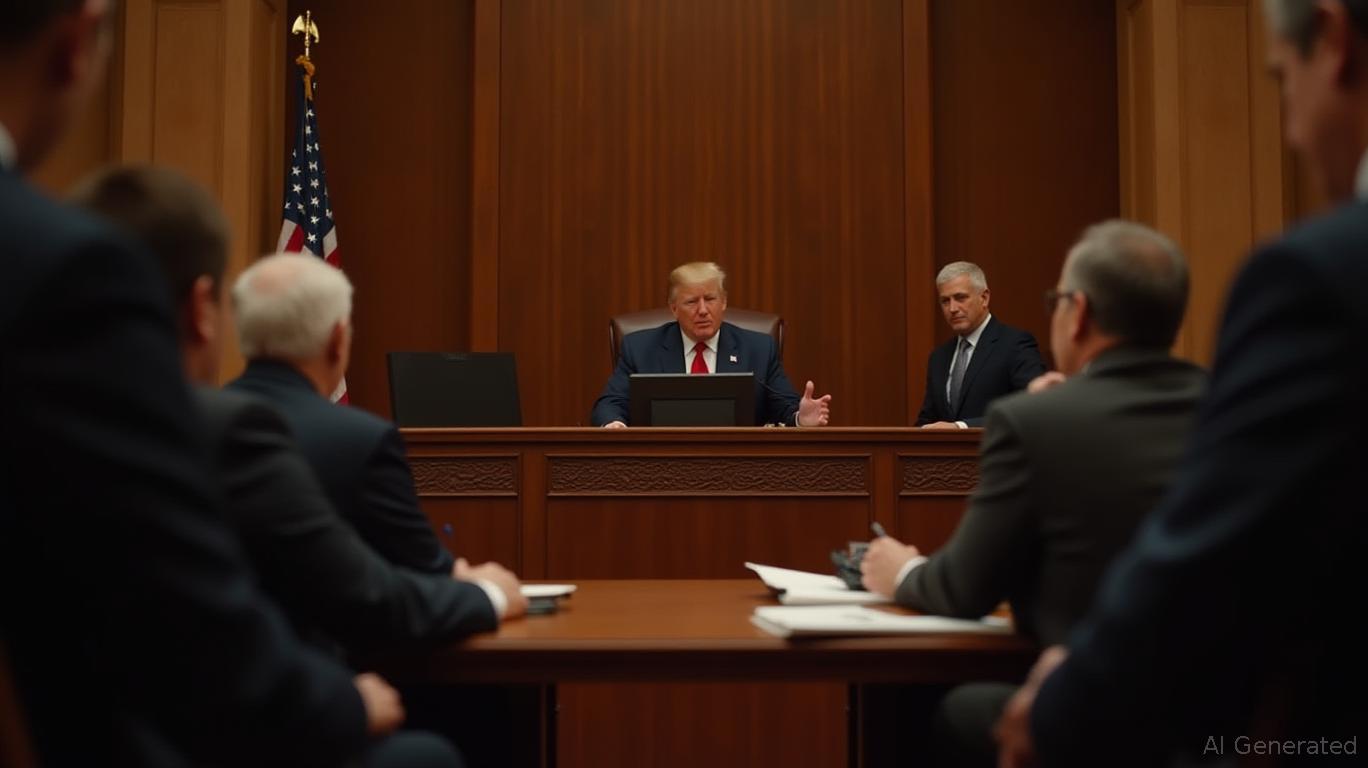Supreme Court Decision on Tariffs May Require $140 Billion in Refunds and Prompt Federal Reserve to Lower Rates
- UBS warns a Supreme Court ruling against Trump's tariffs could force $140B refunds, straining U.S. fiscal resources and prompting potential Fed rate cuts. - The refunds stem from 39% Swiss tariffs deemed potentially unlawful, with fiscal impact equivalent to 7.9% of 2025's projected budget deficit. - Legal challenges highlight executive overreach risks, while reduced tariffs could boost consumer spending and ease inflation, creating room for Fed easing. - Swiss business leaders have lobbied Trump to lowe
UBS Group AG has cautioned that if the Supreme Court rules against former President Donald Trump’s prominent tariff measures, the U.S. government may be compelled to return $140 billion in tariffs, putting pressure on federal finances and potentially paving the way for the Federal Reserve to lower interest rates. The Swiss financial institution’s recent
The possible repayments are linked to ongoing lawsuits challenging Trump’s 39% tariffs on Swiss imports—the steepest among developed nations—as well as similar duties targeting other countries. Should the court find these tariffs illegal, the U.S. Treasury would be required to issue substantial refunds, amounting to 7.9% of the projected 2025 federal deficit, according to the

The fiscal consequences could encourage the Fed to adopt a more accommodative stance. UBS suggests that if tariffs are lowered following a court decision, American consumers would see increased purchasing power, inflation would ease, and the central bank would have more scope to cut rates. "This scenario would allow the Fed to move toward policy normalization without the risk of runaway inflation," UBS notes. This view is consistent with market sentiment, as investors are already expecting a rate reduction in December, with additional cuts likely in 2026, according to a
The legal dispute over tariffs has escalated as the Supreme Court considers whether the Trump administration exceeded its powers under the International Emergency Economic Powers Act. A
UBS also points out that the overall market effect of tariff refunds would be modest. While importers might benefit from lower expenses, these gains are unlikely to meaningfully impact S&P 500 profit forecasts, since tariffs have not been a major drag on corporate earnings, the bank observes. UBS expects that if trading partners avoid retaliatory actions, the U.S. economy would remain stable and equity markets would likely react positively to reduced trade friction.
Nonetheless, the Fed’s willingness to cut rates will depend on the broader economic environment. Officials from the Trump administration, including Treasury Secretary Scott Bessent, have warned of possible recession risks and urged the Fed to act swiftly, as reported by the
With legal and economic factors intersecting, UBS’s analysis frames the potential rollback of Trump-era tariffs as a turning point for U.S. fiscal and monetary strategy. The decision could reshape trade policy and provide the Fed with an opportunity to adjust its approach in the wake of the pandemic.
Disclaimer: The content of this article solely reflects the author's opinion and does not represent the platform in any capacity. This article is not intended to serve as a reference for making investment decisions.
You may also like
XRP News Today: Bulls and Bears Battle Over XRP’s Key $2.50 Mark Amid Rising Volatility
- XRP faces intense bearish/bullish battle as $7M leveraged short positions clash with Binance's $8.4B futures inflows, creating $3.4B open interest. - Technical analysis highlights $2.50 pivot level with Fibonacci targets at $2.77-$3.10 if bulls break resistance, while breakdown risks $1.94. - Ripple's $500M funding at $40B valuation and Mastercard partnership fuel debate over XRP's intrinsic value vs. $87.5B escrow-linked worth. - Macro risks including Trump tariff ruling uncertainty and potential XRP ET
Remote Access Challenge: Norway Protects Buses Against Cyber Risks
- Norway's Ruter operator strengthened cybersecurity after tests showed Yutong electric buses could be remotely shut down, raising global concerns over connected vehicle vulnerabilities. - Controlled experiments revealed Yutong's 2023 models allowed remote diagnostics access compared to older Dutch VDL buses lacking over-the-air update capabilities. - Yutong claimed compliance with local laws and German data storage, but Ruter highlighted retained remote access to critical systems like battery controls. -

As artificial intelligence converges with blockchain technology, businesses are redefining the standards of market rivalry
- Somnigroup International Inc. announced Q3 2025 strategic shifts toward AI integration and digital transformation to enhance data-driven competitiveness. - Daydream's Scope platform launched real-time AI video tools with SDXL support, expanding creative control via open-source collaboration. - Bitcoin .com and Concordium partnered on age-verified stablecoin payments using zero-knowledge proofs to address regulatory compliance challenges. - Robinhood's tokenization proposal sparked debate over Web3's role

Bitcoin Updates: Trump-Era Regulatory Changes Open Crypto Access to Hedge Funds
- Trump's pro-crypto policies drive 55% of hedge funds to hold crypto assets, up from 47% in 2024, with 7% average allocation. - Regulatory clarity via the GENIUS Act and Strategic Bitcoin Reserve reduced legal risks, boosting institutional confidence in digital assets. - Derivatives dominate 67% of crypto strategies while spot trading grows to 40%, reflecting evolving risk management approaches. - BlackRock/Fidelity's Bitcoin holdings and DeFi expansion highlight sector growth, though October's $20B liqui